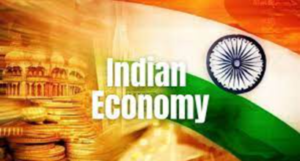Indian economic prospects may require a more realistic analysis.
Relevance:
- GS Paper- 3 Indian Economy and issues relating to planning, mobilization, of resources, growth, development, and employment.
- Inclusive growth and issues arising from it.
- Tags: #indianeconomy #challenges #growth #currentaffairs #upsc.
Why in the News?
RBI released recent economic indicators.
Bazaars as Cultural Foundations
- The bustling bazaars, with their vibrant chaos and cacophony, have played a vital role in shaping human society since time immemorial.
- Anthropologists often turn to these marketplaces to gain insights into distant cultures, and they serve as windows into modern India.
India at a Crossroads
Promising and Troubling Realities
India’s economic landscape is a mix of promise and concern. While the country’s economy showed strength in recent years, it faced significant setbacks, notably a 7% contraction in 2020-21 due to a poorly executed pandemic lockdown. Youth unemployment remains high, and wealth inequality persists.
Challenges in the Economic Landscape
- Manufacturing Exodus: The disappearance of manufacturing jobs is a growing concern. This phenomenon places additional strain on the agricultural sector, which must absorb a larger portion of the workforce.
- Struggling Small Businesses: Small and medium-sized enterprises (SMEs) are grappling with challenges. The adverse economic impact on these businesses has broader implications for employment and economic stability.
- Inflation Pressures: High food-price inflation is squeezing the middle and lower-middle classes, making essential goods less affordable for many citizens.
- Private Investment Decline: Private sector investment, as measured by gross fixed capital formation, has seen a significant decline. It has fallen from consistently exceeding 25% of GDP in the period from 2005 to 2013 to less than 20% in the fiscal year 2020-21. This decline erodes confidence in India’s future economic prospects.
A Deepening Political Challenge
India’s political landscape presents its own set of challenges, which are of increasing concern.
- Erosion of Democracy: The erosion of democratic values raises apprehensions about the future of India’s political system and governance.
- Rise of Cronyism: The rise of cronyism is particularly alarming. It enables a select few, often the wealthiest, to wield disproportionate influence, leading to policy decisions that primarily serve their interests.
- Growing Minority Insecurity: Minority groups face heightened insecurity, undermining the inclusive ideals upon which Independent India was founded.
The Menace of Cronyism
Cronyism is a pervasive issue in India, with far-reaching consequences-
- Economic Stability Threatened: Cronyism threatens economic stability by perpetuating inequality and concentrating wealth among a select group.
- International Deals Favoring the Elite: International actors often engage in deals that cater to the interests of the wealthiest and powerful, often at the expense of broader societal welfare.
Religious Discrimination’s Economic Toll
Religious discrimination, when combined with cronyism, can lead to sustained economic decline, as witnessed in Pakistan.
Comparative Example: Pakistan, which had a higher per capita income than India until 2004, experienced economic decline due to a combination of cronyism and religious fundamentalism. This underscores the long-term consequences of such trends.
Hope Amidst Uncertainty
Despite these challenges, conversations with diverse segments of society offer glimpses of hope.
- Awareness of Dangers: Individuals across various sectors, from market vendors to university students and government officials, display a growing awareness of the detrimental effects of religious bigotry and cronyism.
The Path Forward
The choices India makes today will shape its future.
- Prosperity and Stability: India’s future prosperity and stability hinge on these choices, determining whether the nation continues to exemplify democracy and inclusion on the global stage. These challenges demand thoughtful, inclusive, and equitable policy measures to address the economic, political, and social concerns that confront the nation.
Sources: Hindustan Times.
Mains Questions
Analyze India’s economic challenges, including manufacturing decline, small business struggles, inflation, and declining private investment. Assess the political complexities like eroding democracy, cronyism, and minority insecurity, and their potential impact on India’s economic stability. 250words.




